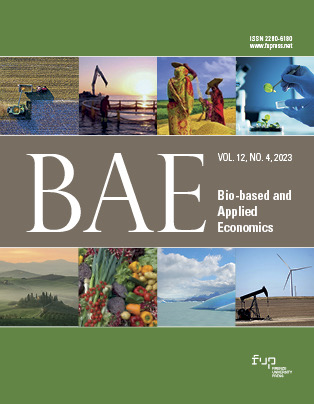Published 2023-12-31
Keywords
- COVID-19 shock,
- bioeconomy,
- socioeconomic indicators,
- European Union,
- green transition
- resilience ...More
How to Cite
Copyright (c) 2023 Jesús Lasarte-López, Nicola Grassano, Robert M'barek, Tévécia Ronzon

This work is licensed under a Creative Commons Attribution 4.0 International License.
Abstract
Using the latest release of employment and value added numbers in the bioeconomy sectors, we conducted an analysis on the performance of the EU bioeconomy during the COVID-19 pandemic in 2020. Our findings point to a possibly higher level of resilience of the bioeconomy sectors compared to the overall economy. While employment in the bioeconomy registered a similar (but slightly sharper) decrease to the total EU average (-1.7% vs. -1.4%), the value added fell substantially below average (-0.4% vs. -4.0%). The more contemporary biomass-processing sectors (chemicals and pharmaceuticals, as well as bioelectricity) performed better than the more traditional sectors (such as food or textiles). At the Member State level, we observe a high degree of heterogeneity in sectoral performance. By discussing these estimates alongside previous qualitative insights from the related literature, we emphasize the relevance of the bioeconomy not only for environmental sustainability but also for socioeconomic resilience.






